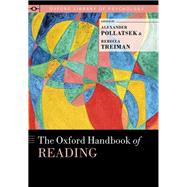- ISBN: 9780199324576 | 0199324573
- Cover: Hardcover
- Copyright: 8/18/2015
Writing is one of humankind's greatest inventions, and modern societies could not function if their citizens could not read and write. How do skilled readers pick up meaning from markings on a page so quickly, and how do children learn to do so? The chapters in the Oxford Handbook of Reading synthesize research on these topics from fields ranging from vision science to cognitive psychology and education, focusing on how studies using a cognitive approach can shed light on how the reading process works.
To set the stage, the opening chapters present information about writing systems and methods of studying reading, including those that examine speeded responses to individual words as well as those that use eye movement technology to determine how sentences and short passages of text are processed. The following section discusses the identification of single words by skilled readers, as well as insights from studies of adults with reading disabilities due to brain damage. Another section considers how skilled readers read a text silently, addressing such issues as the role of sound in silent reading and how readers' eyes move through texts. Detailed quantitative models of the reading process are proposed throughout. The final sections deal with how children learn to read and spell, and how they should be taught to do so. These chapters review research with learners of different languages and those who speak different dialects of a language; discuss children who develop typically as well as those who exhibit specific disabilities in reading; and address questions about how reading should be taught with populations ranging from preschoolers to adolescents, and how research findings have influenced education.
The Oxford Handbook of Reading will benefit researchers and graduate students in the fields of cognitive psychology, developmental psychology, education, and related fields (e.g., speech and language pathology) who are interested in reading, reading instruction, or reading disorders.
To set the stage, the opening chapters present information about writing systems and methods of studying reading, including those that examine speeded responses to individual words as well as those that use eye movement technology to determine how sentences and short passages of text are processed. The following section discusses the identification of single words by skilled readers, as well as insights from studies of adults with reading disabilities due to brain damage. Another section considers how skilled readers read a text silently, addressing such issues as the role of sound in silent reading and how readers' eyes move through texts. Detailed quantitative models of the reading process are proposed throughout. The final sections deal with how children learn to read and spell, and how they should be taught to do so. These chapters review research with learners of different languages and those who speak different dialects of a language; discuss children who develop typically as well as those who exhibit specific disabilities in reading; and address questions about how reading should be taught with populations ranging from preschoolers to adolescents, and how research findings have influenced education.
The Oxford Handbook of Reading will benefit researchers and graduate students in the fields of cognitive psychology, developmental psychology, education, and related fields (e.g., speech and language pathology) who are interested in reading, reading instruction, or reading disorders.







